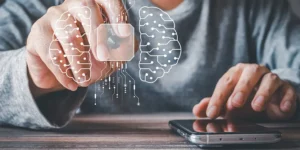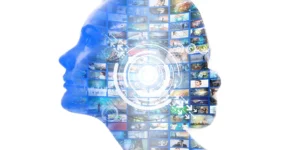Artificial Intelligence, often abbreviated as AI, has become a household term in recent years. Virtual assistants, individualized recommendations, and self-driving automobiles, AI is everywhere. But what exactly is artificial intelligence, and how does it work? We’ll explain how Artificial Intelligence works in this blog, its applications, and its significance in our rapidly evolving world.
Defining Artificial Intelligence (AI)
The ability of technology, particularly computer systems, to replicate human intellectual capabilities is known as Artificial Intelligence. Learning (the process of acquiring knowledge and the rules for using it) is one of these processes., reasoning (using rules to reach approximate or definite conclusions), problem-solving, understanding natural language, and perceiving the environment.
Types of Artificial Intelligence
Narrow or Weak AI: This type of AI is designed and trained for a particular task. It’s what we commonly encounter in our daily lives, such as voice assistants like Siri or recommendation algorithms on streaming platforms.
General or Strong AI: General AI, also known as AGI (Artificial General Intelligence), provides intelligence comparable to that of humans and is capable of handling any intellectual activity. This level of AI is still largely theoretical and has yet to be fully realized.
How Does AI Work?
At its core, AI relies on data and algorithms. Here’s a simplified breakdown of how it works:
Data Collection: AI systems require vast amounts of data to learn and make decisions. This data can be in the form of text, images, audio, or any other relevant format.
Training: The collected data is used to train AI models. During training, the AI system identifies patterns, associations, and relationships within the data.
Algorithm Processing: After processing the data, AI systems use the patterns they’ve discovered to create predictions or decisions.
Feedback Loop: AI systems often incorporate a feedback loop where the outcomes of their decisions are used to refine and improve their algorithms further.
Applications of Artificial Intelligence
The applications of AI are diverse and continue to expand rapidly. Some notable examples include:
Natural Language Processing (NLP): AI-powered language models like GPT-3 can understand and generate human-like text, enabling chatbots, virtual assistants, and language translation services.
Computer Vision: AI can analyze and interpret visual information, leading to applications like facial recognition, object detection, and medical image analysis.
Healthcare: AI is used for disease diagnosis, drug discovery, and personalized treatment plans based on patient data.
Finance: AI algorithms predict market trends, manage portfolios, and detect fraudulent transactions.
Autonomous Vehicles: Self-driving cars use AI to navigate and make real-time decisions on the road.
Recommendation Systems: Services like Netflix and Amazon use AI to suggest content and products based on user preferences.
Significance of Artificial Intelligence
AI has the power to revolutionize industries, increase productivity, and improve our quality of life. Its ability to analyze vast datasets, automate tasks, and make decisions quickly and accurately can revolutionize various sectors. However, it also poses ethical and societal challenges, such as concerns about privacy, bias in algorithms, and the impact on employment.
The exciting field of artificial intelligence is shaping our world. It covers a wide spectrum of uses, from straightforward voice assistants to sophisticated autonomous systems. As AI technology advances, it’s essential to ensure responsible development and deployment, addressing ethical and societal considerations to harness its full potential for the benefit of humanity. Understanding what AI is and how it works is the first step in navigating this exciting and transformative technological landscape.
To know more about Digital Marketing, Please visit https://paypercampaign.com/
Image by iuriimotov on Freepik





